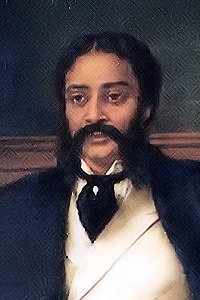Introduction
Words: Michael M. Dutt, 1843.
Music: Aberdeen possibly by Andrew Tait, in James Chalmers’ untitled collection, 1749. Melody from Rudiments of Music, by Robert Bremner, 1756 (🔊 pdf nwc).

The people that walked in darkness have seen a great light: they that dwell in the land of the shadow of death, upon them hath the light shined.
Isaiah 9:2
Words: Michael M. Dutt, 1843.
Music: Aberdeen possibly by Andrew Tait, in James Chalmers’ untitled collection, 1749. Melody from Rudiments of Music, by Robert Bremner, 1756 (🔊 pdf nwc).

A student of the Hindoo College, named Modoosoodun Dutt, had for some time past determined to renounce the religion of his fathers, and to embrace Christianity.
It is very singular, that before he had actually made up his mind to take this step, he had received no clerical instruction whatsoever, having been in the habit of reading books and tracts by himself.
A few weeks ago, he presented himself before a clergyman in Calcutta [Kolkata], as a Catechumen, and stated his willingness to embrace the religion which reason, conscience, experience, all conspired to tell him was the true one. He was shortly afterwards introduced to the archdeacon, who was highly satisfied with the proofs he exhibited in himself of a sound faith and a well grounded conviction.
His relations being men of wealth and respectability, he was subjected to a great deal of annoyance and trouble. He withstood their opposition with a great firmness, and continued unshaken in his determination.
A thousand rupees, in Government security, were sent to him, with a request that he should immediately take his passage to England, and get baptized there, that no obloquy might be cast upon his family by his embracing Christianity on the spot. He refused the gift upon such conditions, and was baptized in the old church of Calcutta, by the Venerable Archdeacon Dealtry.
He had been accustomed to write occasional pieces of poetry in the Hindoo College, and several of his productions were printed in the Literary Gazette and other periodicals there. On the occasion of his baptism, he composed the following verses.
The Friend of India, February 6, 1843, quoted in Memoirs of the Life and Writings of James Montgomery, by John Holland & James Everett (London: Longman, Brown, Green & Longmans, 1856), pp. 213–14
Long sunk in superstition’s night
By sin and Satan driven,
I saw not, cared not, for the light,
That leads the blind to Heaven.
I sat in darkness—reason’s eye
Was shut, was closed in me:
I hastened to eternity
O’er error’s dreadful sea.
But now at length Thy grace, O Lord,
Bids all around me shine:
I drink Thy sweet, Thy precious word;
I kneel before Thy shrine.
I’ve broke affection’s tenderest ties
For my blest Savior’s sake:
All, all I love beneath the skies
Lord, I for Thee forsake.